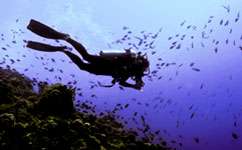Cutting fishing could buy time for coral reefs

Stopping people fishing around Caribbean coral reefs by designating them legally protected marine reserves could help some of them survive the effects of a changing climate by more than 50 years.
That's the conclusion of a study to find out how best to protect coral reefs as coral bleaching events and hurricanes get more frequent.
Coral reefs are some of the world's richest and most diverse habitats, hosting around 25 per cent of all known marine life in just a quarter of a per cent of the Earth's oceans.
The trouble is they don't cope well with even small increases in sea temperature: a rise of just one degree Celsius above average for a few weeks is enough to kill off 95 per cent of individual corals, becoming what scientists call 'bleached'.
But researchers found that protecting the fish that live around Caribbean coral reefs could extend the life of some reefs.
How long a reef's lifespan might be increased by depends largely on where it is. In places that are frequently hit by hurricanes – like the Bahamas – the lifetime of reefs could be extended by just 18 years.
For reefs less likely to be ravaged by Atlantic storms, the future looks brighter. If coral reefs in Bonaire – a Caribbean island just north of Venezuela – were protected from fishing in marine reserves, they could last more than 50 years longer than undefended reefs.
"Bonaire is much more sheltered from hurricanes than the Bahamas, so this will buy time for local people to adapt to depleted reefs off the island's shores," says Professor Peter Mumby from the University of Exeter, who led the study.
The reason fish are so important for coral reefs, is because some species, like the parrotfish, graze on the algae which competes for space with corals. And if there's less algae around, corals recover from damage more quickly.
Now Mumby and his colleagues have shown that protecting parrotfish delays the rate of coral demise.
The team's findings should help focus reef management efforts in places where they're likely to have the greatest effect, and give us some idea of how much longer we can expect individual reefs to last.
Over the last 30 years, 'corals have been more affected by changes in the Earth's climate than any other ecosystem on Earth', write the authors in their study published in Global Change Biology.
But coral bleaching and more hurricanes are expected to hit coral reefs badly as the climate changes, with some climate models predicting that coral bleaching will happen every year by 2050.
Coral reef conservation managers have few options open to them to deal with these threats. But Mumby and his colleagues wondered if reefs might fare better if they were protected in marine reserves.
Using a climate model, they tested the effect of both coral bleaching and hurricanes on reefs in contrasting regions of the Caribbean - in Belize, Bonaire and the Bahamas - when protected in marine reserves and when unprotected,.
To simulate the most likely changes in the climate until 2099, they used the well-tested Hadley Centre model, which scientists call HadGEM1.
"Our study assumes a limited appetite of society to control greenhouse gas emissions and also assumes that corals won't find a way to cope with warmer temperatures. We may yet be surprised by the ability of corals to adapt, but the jury's still out on that," says Mumby.
Mumby and his colleagues are now aiming to incorporate information on the ability of corals to adapt to stress, and to extend their models to represent reefs elsewhere in the world.
This story is republished courtesy of Planet Earth online, a free, companion website to the award-winning magazine Planet Earth published and funded by the Natural Environment Research Council (NERC).
More information: Helen J. Edwards, et al. How much time can herbivore protection buy for coral reefs under realistic regimes of hurricanes and coral bleaching?, Global Change Biology, Volume 17, Issue 6, pages 2033-2048, June 2011, DOI: 10.1111/j.1365-2486.2010.02366.x
Provided by PlanetEarth Online
















